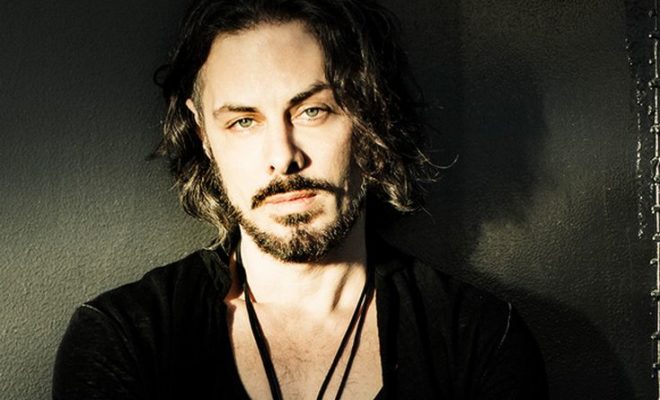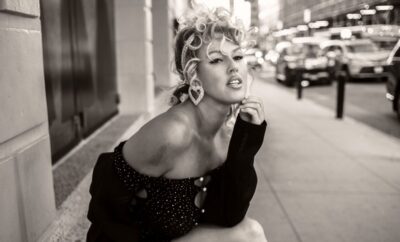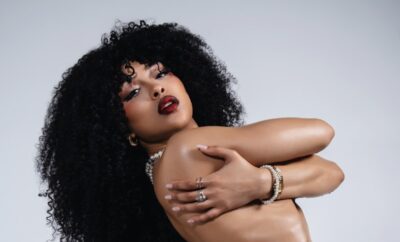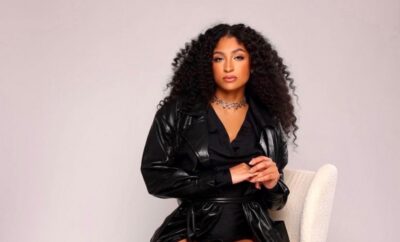
Interviews
Richie Kotzen – 50 for 50
By: Jennifer Vintzileos
Q) What motivated you to release 50 for 50?
RK: Well, originally, I had about twelve or fourteen songs finished and those songs would have been my next album that I would have put out around this time. And when I was on the road, I was traveling with a hard drive that basically mirrored my studio at home and I started going through some of these old ideas that I never finished. I’ve discovered a few other things that I haven’t finished and for whatever reason, never released. And then I thought to myself, “Well, man, I really…I have some free time when I get home. I should try and finish this material. There’s no reason for this to have sitting around for all these years.” And in the back of my mind I had the thought, “Wow, if I could get all this done and stop when I have a total of fifty songs, maybe I could release all fifty at the same time for my 50th birthday.” There’s just something internal in my head that I thought would be like a fun thing you know to do – if I could pull it off. And so, I got home, I started working and before I knew it…I was not only finishing the old stuff, but I was writing brand new songs on top of it. And it just kind of came together over the course of three months that I got to the number. I had fifty songs that were finished and I sent them off to my mastering guy and we had ended up with a record. So, there it is. The good news is now I don’t have to worry about recording for another five years.
Q) One of my favorite tracks on this album is “Devil’s Hand,” which you not only wrote but directed the music video for. What was it like getting to be behind the camera as well as in front of it for the video?
RK: Well, I had storyboarded that song out scene for scene. I had a concept, which is what you see – the character that kind of lost everything and was basically living out of the van and having these kinds of flashbacks to a happier time. And so, in order to pull that off, we had to shoot that on three separate days. So, I had the one shoot was me with the beard, the down and out kind of character. And then once we knew, had all the shots, I cleaned up and shaved and then we came back and did the flashback scenes. And then the final scene was with the performance at the end. We did that in downtown LA on location and then just put it all together. And the only thing was I was just nervous about making sure I got all the shots I needed because music videos are tricky. Sometimes you have a concept and you see it and it doesn’t really play the way you wanted it to. But I think in the end we got everything we needed and the videos up and people seem to be responsive. So, we’re all happy about it.
Q) Your wife Julia Lage was also in the video for “Devil’s Hand.” How did you come up with the concept to feature her?
RK: Okay, well I was going to hire an actress to be the love interest and then I just wanted there to be a certain level of honesty and comfort. And so, I asked her about it and she said, “Well, I can do it.” She was comfortable doing it and I knew I was really trying to portray two people that were happy together and in love. And I wanted that to be strong against the other footage, which was the character being virtually homeless and reminiscing on a past life. So, I thought that that would play the contrast between those scenes. I thought that would be strong. And Julia did a great job. It was really super easy to pull that off.
Q) Which songs off of 50 for 50 would you consider the most personal to you and why?
RK: Well, it’s hard to answer because what’s going to happen is, I will start naming songs and I’ll end up naming fifty and we will be on the phone for an hour, but I can give a shot. Obviously, “Devil’s Hand” because I led with that song as the first single. I really love the storyline and the lyric and just how it all came together and the recordings. I tried some different approaches on the arrangement with the ending where it kind of takes a totally different turn. So, that was a fun song for me. And I think it’s an important one for the record. The opening song “Stick the Knife” is one of the newer songs. That one just kind of throws back to some of the crazier guitar style that I got known for, but it still maintains its integrity as a song. And probably the third one I would mention would be “Nickel Hustler.” Uh, I just think that it was so much fun to record that. And the bass guitar and the keyboard based, the way they interplay together, it was really a lot of fun to create. So, those would be my top three.
Q) 50 for 50 was released by your own label Headroom Inc. How did you come up with the name for the label and what made you decide to release your music through Headroom rather than through a more mainstream label?
RK: Well, the name “Headroom” comes from a studio that I owned years ago in North Hollywood. I had bought a commercial building at one point and converted it to a recording studio. And the term headroom is kind of a studio kind of term. It refers to how loud you can make something before it distorts and that differential would be how much head room you have. So, that’s where the name came from. It’s just an audio term and the studio doesn’t exist anymore, but I started then releasing records by myself directly to consumer and so I use that studio name is my label name. And the reason to answer your question, I mean there’s nothing better than having a major label like universal or BMT 100% behind you. But the reality is for the music that I do and my pedigree, they really wouldn’t very much interested in getting involved with me as I’ve learned over the years. So, it makes sense for me to do things on my own. The reason that works for me is I already have a fan base that I’ve been developing since 1990. So, it just makes everything truer to the artistic scope of what I’m doing. I don’t have to answer to someone. The minute you take money from somebody, no matter how generous they are, they’re going to want to earn their money back and a profit. And, in that situation, as an artist ultimately, you’re going to be asked to do things that go against your natural instinct creatively. So, I don’t want to have to deal with any of those things and I’m able to survive by releasing it on my own.
Q) On your website I saw that you were touring in the US and abroad this summer. Are your upcoming shows going to be more focused on 50 for 50 or can fans expect a little bit of everything?
RK: I would say a little bit of everything. I mean, I liked the idea of doing some new songs, but there’s also songs that I’ve been doing for many years that people want to hear live. So, I think it would be a mixture of both.
Q) You’ve had quite the career being in Poison, Mr. Big and Winery Dogs, with the main focus being on your solo career. What do you find was a benefit to being a solo artist versus being in a band?
RK: Well, it goes back to my childhood and I grew up in a place where it’s fairly isolated. So, if anything neat was going to get done, I needed to do it myself. I quickly learned that I was going to have to make my own demos and create my own music. And I remember putting a drum set in a makeshift studio that I have, which was really nothing more than a barn with electricity. And I had a little tape machine and I started doing things on my own. And the people that I looked up to were solo artists. So, I envisioned, when I was a kid…I never had the dream of being in a band. I just wanted to make music. And so I would look at people like Prince and David Bowie and Stevie Wonder and those were my influences and my inspiration. So, I just kind of followed that thread and that’s probably why now all this time later I’ve got so many records out. I just kept writing and kept releasing them. On the other side of that, working with people is very rewarding too. I love collaborations. I think we did something very special with The Winery Dogs when we did the first record and the follow-up record Hot Streak and, hopefully, there’s going to be more of that.
Q) You were speaking of some of your musical influences. Who were some of your greatest musical influences growing up?
RK: I’ll tell you, the first I can think was when I saw Stevie Wonder at the Valley Forge Music Fair, just outside of Philadelphia. He was on a round stage and it circulated so you could see him at any point, that was just fantastic. He blew my mind. And then about a month later I saw George Benson there in the same venue, in the same configuration. So, they became instantly two massive influences. As far as singers, early Rod Stewart. The Every Picture Tells A Story record was a huge influence on me. Later on, Terence Trent D’arby, when he came out with his record Introducing the Hardline [According to Terence Trent D’Arby], I really love that record. Wore it out. So, those are some of my biggest influences on the guitar. The first guitar player that I really got into was Eddie Van Halen, but I was so far behind I didn’t hear Van Halen until Michael Jackson’s “Thriller” came out. So, I knew more about Michael Jackson than they did Van Halen. But then when I heard Eddie, I became a massive fan.
Q) In your down-time, what are some of your favorite go-to songs to jam?
RK: Well, I don’t really—this is going to sound odd. I don’t really pick up the instrument unless I’m writing. So, there will be long periods of time where I don’t really play at all. And I’m not the kind of guy that likes to go out and just have jam sessions and just play for the sake of playing. I’m more of the kind of person that looks at the instrument as a writing tool and so if I have an idea, then at that point I’ll go in the studio and start working on things. But I will tell you that I love the same music that I grew up on. So, if I’m having a barbecue or something, there will be the Eagles, they’ll be playing or you know, Stevie Wonder or old R&B like The Spinners and that’s kind of the go-to stuff for me that, that I listen to when I’m not actually playing music.
Q) Speaking of what you’re listening to, what artists are you currently listening to and who would you most like to collaborate with in the future?
RK: Well, I’m embarrassed to say that I’ve been so buried in 50 for 50, I don’t really even know what’s going on out there. And in the modern, in present time, as far as new artists…I honestly don’t…I couldn’t name one new artist and I’m kind of embarrassed. When I say new, I mean new. I don’t mean an artist that’s been around for ten years. So, I don’t really know. I’m kind of… I don’t really know, a lot about what’s happening in modern music and pop music. I suppose there’s people that it would have been great to meet or work with, be it Jimi Hendrix or Steve Wynwood or those kind of folks – the originators. It’d be really cool to kind of go back in time and be around and those guys were at their prime. But as far as what’s happening today, there’s not a lot happening in today’s music that really connects with what I do and what I’m interested in.
Q) In your 30+ years in the music business, what was the best advice you have ever received?
RK: It was said to me by Ozzy Osbourne. Somehow, I found myself in a hotel suite with him and I remember we watched the movie Dumb and Dumber together and we were talking about the music business. I was signed to Geffen Records and we were talking about my deal and my experience with the label and he said, “My advice to you: always take the money.” And what he meant by that is we were talking about how a lot of times back then companies would say all kinds of things to you like, “Oh, we’re talking a twenty-year career box sets and all this hype.” But then, if you had one company saying all these great things they were going to do and another company that didn’t take your phone call but they were going to write a check for a half a million dollars to make your records, always take the money. And, so in the end, I’ve loved this advice because there’s so much bull**** and lip service in the music business that the only thing that you’re really can get any kind of a variable on is who’s willing to get behind, put their money where their mouth is, so to speak. So, that was the best advice I ever got.
Q) What would you like to share with your fans?
RK: Well, at this point, the most important thing I can share is my music. And I think they’re going to have plenty if they’re interested, plenty of material to get through. I tried to listen to the record and even I, as the person that created the record, can’t do it in one sitting. I have to break it up. So, I think it’s going to be a fun record for the people that are interested in what I do. And on top of that, I want to thank everyone because I made my first record in 1989 and I’m releasing this in 2020. So, it’s been a long time that I’ve been able to make a living, playing music and sharing it with people. And that means the world to me. So, I want to thank everyone for that.





You must be logged in to post a comment Login